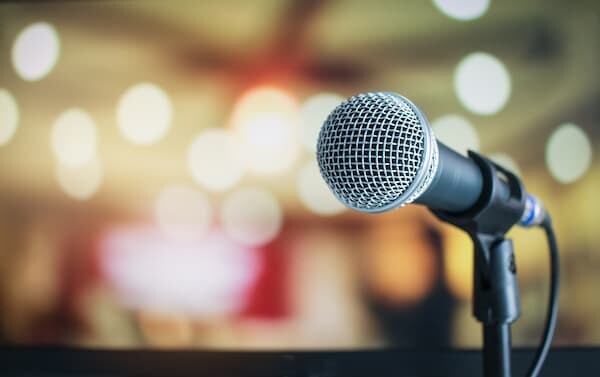5 Common Mistakes New Comedians Make Starting Out

Shutterstock
Welcome to Cracked's Comedy 101, where we offer comedy coursework without adding all that much to your student loan debt. Today, we'll be covering how to avoid some common mistakes starting out.
Last February, I wrote an article listing off five tips to prepare for your first time doing stand-up comedy at open mic night. I’m assuming the experience went well for you, because now I’m back with some advice for the next step: your first year of being a paid stand-up comic… maybe your first two years depending on your learning curve.
Don't Miss
I’ve worked as a comic for 14 years, I have been in charge of booking shows, producing shows, and have spent years reviewing submissions for comedy festivals and contests. Not saying that to flex or anything, just merely to say I’ve been around the block enough times to spot the cracks in the sidewalk everyone seems to trip on.
Hosting a Comedy Show Can Level You Up
When a comic is doing a set, their time is all about them. They have a short amount of time to get the audience to like them. But when a comic is the host of the show, it’s a different set of responsibilities. The host is the conductor keeping the train moving along, and getting to tell jokes is really more of a bonus. Being a great comic doesn't automatically mean you’ll be a good host, but learning to be a great host will make you a better comic in the long run.
It all boils down to stage presence and energy. The host has to get and keep the audience hyped up for what comes next, and to make sure the show runs smoothly. When you are the host of the show, you are the first person the audience meets. You’re facing a room full of people who are total strangers to you and to one another and it’s your job to gain their trust so when you say “We’ve got a great show for you tonight…”, they believe you. Even if one of the other comics on the show bombs hard, the host should be able to take the stage and assure the audience that everything’s gonna be OK.

Shutterstock
It’s not just about getting the audience ready for the next comic, but also making sure the stage is ready as well. Moving the mic stand back and adjusting it, getting the mic cord out of the way, and moving the barstool… all so the next comic can get right to work when they’re called up.
Getting proficient at hosting will teach you so many skills that'll come in handy. You learn how to deal with a cold crowd, how to read the room, to engage with the audience, and how to de-escalate tense situations. But most of all, it teaches you showmanship.
Learn How To Use A Microphone And Practice Stage Equipment Etiquette
This may sound like a minor pet peeve, but a lot of comics really don’t seem to know how microphones work.

Shutterstock
If you can hear yourself coming through the speakers just slightly louder than you hear what's coming out of your own mouth, you’re talking at just the right volume for the audience to hear you well. If you project your voice, move the mic further away. Point the mic at your throat not your mouth or else that mic might catch all of your breath while you speak, and you wind up sounding like an obscene phone call or a Wendy’s drive-thru.
And, there’s no way I can say this without making it sound dirty, but hold the mic by the shaft. Not the base, not the bulbous tip, the shaft. Holding it by the base puts stress on the mic cord connection, and cupping your hand around the windscreen (the metal mesh at the end) is only for rappers and hard rock singers because they’ve got so much loud music going on around them the mic wouldn’t pick up their voice any other way.
If you plan to do a literal mic drop, just know that the next thing you'll do is to cough up $100 cash for a new one. $400 if it’s wireless. You may think it’s a cool move, but whoever owns that microphone will want to kill you.
If you’re not gonna use the mic stand to hold the mic, move it out of the way and leave it the hell alone. Don’t lean on it, don’t hold onto it during your set and play with the mic clip while you’re talking. For one, those gestures could make you look nervous as hell. For another, there may only be one mic stand at this show. The bad news is, mic stands are often very cheaply made and therefore break easily. The good news is they don’t cost a lot to replace, but more bad news: that may be coming out of your pay.
And if you’re thinking, “Well, Bill Burr leans on the mic stand all the time! Patton Oswalt is always playing with the mic stand…” Yeah, look at their paycheck compared to yours. The phrase you break it, you bought it doesn’t mean anything to them. Besides, they’re headliners. They don’t have to worry about breaking the mic stand because no one is going up after them.
The best way to understand how to use this equipment is to have your own. Buy yourself an SM58 mic, cords, stand, a cheap sound board and amp to have at home to use for practice. You can always find them cheap on Craigslist because so many musicians are either trying to afford an upgrade or giving up on their dreams. Get to know how this stuff works and you’ll also learn what all you can do with it. Bill Hicks would make all sorts of amazing sound effects with the mic during his sets, and the way he learned how to do that… was messing around with his own mic setup at home.
Your First Twenty Seconds On Stage Is The Most Important
When you’ve only got just a few precious minutes on stage, you don’t have a lot of time to win the crowd over. Any moment not spent trying to make them laugh is one less moment they’ll remember you for. So, you need to make a good first impression and make that happen as soon as you possibly can. So, your first twenty seconds on stage are crucial.
First, before you even make it to the mic, there are a lot of time-wasters you should eliminate. Don’t take a long time getting to the stage. Ideally, you should already be ready to take your first step onto that stage as soon as the host finishes announcing your name. No long, drawn out walks from the back of the room, no dancing along to your intro music… Get. To. The. Mic.
Don’t take anything on stage with you other than a drink. A lot of comics waste so much time moving the barstool where they want it, and setting down their drink, their notes, and/or their phone. The barstool is only on stage to hold your drink. There should be no reason for you to bring notes on stage for a paid gig, or your phone to keep track of your time. At an open mic? Sure. But if someone is paying you to do comedy, the very least you could do is remember your set and know how long it takes for you to tell it.
If you’re using your phone to record audio, place it beside the stage before you go up. Or better yet, set it up somewhere in the back if you can to record video instead. You should really be recording video of every time you’re on stage anyway. You might get a great promo clip out of it, or at the very least, you can review the footage to review and improve your set.
Once you open your mouth in front of an audience, get to the jokes as soon as possible. Don’t say things like “Hey, give it up for your host! How’s everybody doing tonight?” The host just got done doing that hype work for you. If you want to thank the host, do it personally as you pass on your way to the mic. Thank the crowd for their applause, and get into your material.
Ideally, you should be speaking into that mic within the first five seconds of taking the stage, and should try to be getting your first laugh by the twenty second mark. This kind of efficiency will make you look really good when a booker watches your set
Don’t Try to Fake It Till You Make It
Social media has taught us just how easy it is for someone to make themselves look like a much bigger deal than they actually are. Every smartphone has a camera, photo and video editing software, and the ability to broadcast worldwide to an audience of people who either don’t know or don’t care what’s even real anymore. But this influencer culture really isn’t anything new in the comedy business. We’ve been dealing with fakes and frauds like this since Vaudeville, and it very rarely works out for them in the long run.
One huge mistake a lot of newer comedians like to make is to try to find the cheat codes for getting booked, and bookers can smell the BS a mile away. They’ll make up or exaggerate credits, like saying they were “featured on Comedy Central” when they only appeared in a wide shot of the audience. They’ll take an on-stage selfie at the Improv open mic and caption it online as a headlining gig. Or, they’ll cold call comedy clubs under a fake name pretending to be their own “agent." By the way, if your “agent” is trying to land you an entry-level gig at a club and doesn’t even know who they need to talk to to get you booked, fire them yesterday.
You wanna know the best way to get a booker’s attention: prove that you are funny. Don’t oversell yourself. Don’t lie to try to land gigs you are not ready for. If you’ve only been at this long enough to have ten minutes of good material, don’t con your way into landing a 30-minute set. Because no one’s gonna care about the good ten minutes, but they’ll definitely remember the twenty minutes where you sucked. That's not the kind of reputation you want. Besides, the last thing comedy needs is another Dan Nainan.

Dan Nainan, Twitter
If you don’t know who Dan Nainan is, it’s definitely not for lack of trying on his part. We could devote an entire week of articles to all the things he lied about to make himself look like the next big thing in comedy. Spoiler alert: Everything ( If you have the time to go down that internet rabbit hole, bring aspirin.)
Check Your Spam Folder!
When you’re just starting out in comedy and sending out emails to bookers trying to land gigs, it can take a while to hear anything back from them. About the only thing you can do is be persistent, but not “I did not appreciate your lawyer’s tone” level persistent. Maybe a nicely-worded email once every couple months is a good rule of thumb.
Bookers are busy, and they get a ton of emails from comics just like you. They will get back to you eventually, even if it’s to say they’re gonna pass. Unless they specifically state otherwise, it doesn’t mean you’re not good enough. It only means you’re not good enough yet. Give it time, get better at comedy, and try again later down the road.
But before you send them another polite email, please… for the love of all things holy… check your f#$%king spam folder! In fact, check it before you go to your inbox! A lot of bookers and club managers may use the same email address or domain to send out mass promotion emails, and when enough people flag those as spam, the filters kick in and sometimes everything that comes from that domain will get flagged as spam. That booker may have already emailed you an offer on a gig, but you wouldn’t know because you didn’t check your f#$%king spam folder!
If the booker said they would get back to you and after several weeks you haven’t received anything, don’t stew on it. Don’t draft an email to tell them where they can stick it. Don’t call them out on social media. Calm your ass down and check your f#$%king spam folder!
And check it every time! Your email provider might automatically delete spam emails after 30 days. If you don’t check that folder regularly, who knows what opportunities you might have missed out on!
Likewise, when you’re trying to get booked somewhere, you no longer have the luxury of not answering calls from an unknown number. That may be a booker with a gig they want you to be on. They’ve got a long list of comics they plan to call right after you, so while you’re checking your voicemail, they might be busy getting a yes from someone else! Answer every call, even if it means you might have to talk to a debt collector. Besides, how are you expecting to ever pay off those debts if you miss out on a gig because you didn’t answer your phone?
BYLINE: Dan Fritschie is a writer, comedian, and frequent over-thinker. He can be found on Twitter (https://twitter.com/FritschieComic), and he thanks you for your time.